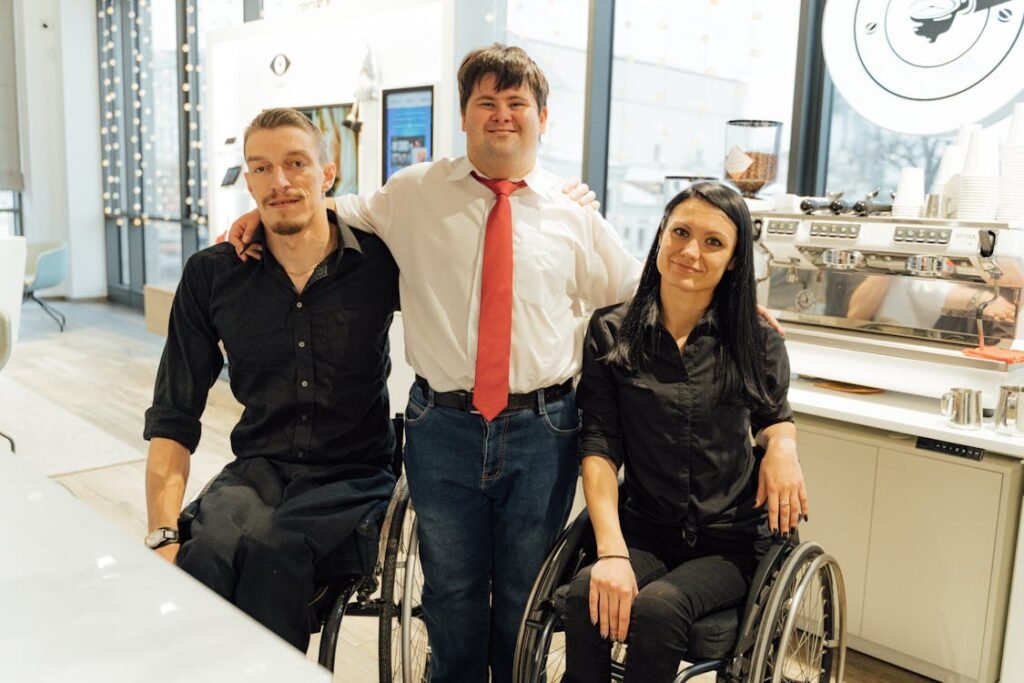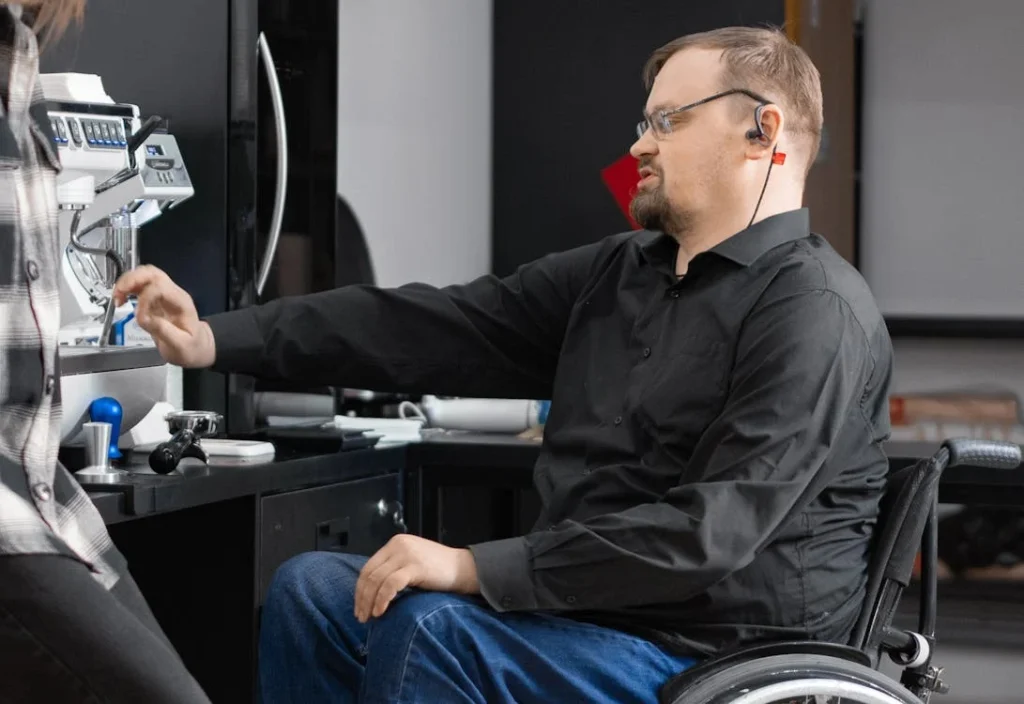Hiring the right talent is one of the most important aspects of building a successful business. But for many disabled candidates, the hiring process itself becomes a barrier. Inaccessible job applications, biased interview practices, and lack of workplace accommodations prevent many skilled individuals from securing jobs they are qualified for.
An inclusive hiring process is not just about compliance with disability rights laws—it is about creating equal opportunities for everyone. Companies that make their hiring process accessible gain access to a wider talent pool, build a diverse workforce, and create an environment where every employee feels valued.
Many organizations want to hire disabled candidates but do not know where to start. This article explores how businesses can remove barriers in recruitment, make job applications accessible, and ensure that hiring managers are trained to support inclusivity. By making small but meaningful changes, companies can attract top talent while building a workplace where everyone has an equal chance to succeed.

Understanding the Barriers in Traditional Hiring Practices
Many businesses have the right intentions when it comes to hiring disabled candidates, but their recruitment processes often create unintentional barriers.
These challenges begin from the very first step—job postings—and continue through interviews, assessments, and final selection. To create a truly inclusive hiring process, companies must first understand where these barriers exist and take active steps to remove them.
The Challenge of Inaccessible Job Postings
For many disabled candidates, the first obstacle they encounter is the job posting itself. Traditional job descriptions often contain vague language that discourages applicants with disabilities.
Phrases such as “must have excellent verbal communication skills” or “must be able to lift 20 kg” can automatically disqualify skilled candidates who may not require these abilities to perform the role effectively.
The format of job postings can also be a problem. Many websites and online portals are not compatible with screen readers, making it difficult for visually impaired candidates to access job descriptions and application forms.
A job listing that is not designed with accessibility in mind may exclude talented individuals before they even get a chance to apply.
Application Forms That Are Difficult to Navigate
Once a candidate finds a job opportunity, the next challenge is completing the application. Many application forms are built in ways that make it difficult for individuals with disabilities to submit their information.
Websites that rely on complex captchas, lack keyboard navigation options, or require precise mouse control can prevent candidates with mobility impairments from completing their applications.
Some job portals do not offer an option for candidates to disclose their disability or request accommodations.
While disclosure is a personal choice, providing an option for candidates to share their accessibility needs can help employers make necessary adjustments during the hiring process.
Unconscious Bias in Resume Screening
Many companies rely on automated resume screening tools or recruiters who may have unconscious biases when shortlisting candidates.
Algorithms that filter resumes based on gaps in employment or unconventional career paths may unintentionally exclude disabled candidates who may have taken time off for medical reasons.
Even when resumes are reviewed by hiring teams, recruiters may make assumptions about a candidate’s ability to perform the job based on their disability status.
Some employers hesitate to invite disabled candidates for interviews due to concerns about workplace accommodations, without assessing the actual skills and qualifications of the individual.
Interview Processes That Are Not Inclusive
The interview stage is one of the biggest hurdles for disabled candidates. Many companies still conduct interviews in office spaces that are not physically accessible, making it difficult for candidates with mobility impairments to attend.
For candidates with hearing impairments, interviews conducted over the phone or in-person without sign language interpretation can make communication challenging.
Those with neurodivergent conditions such as autism may struggle with traditional interview formats that rely heavily on eye contact, body language, and quick responses under pressure.
Even well-meaning interviewers may unintentionally ask inappropriate or irrelevant questions about a candidate’s disability rather than focusing on their qualifications and experience.
The lack of training for hiring managers on how to conduct inclusive interviews often results in an uncomfortable experience for disabled candidates.

Making Job Applications More Accessible
Creating an inclusive hiring process starts with making job applications accessible to all candidates. Many qualified disabled professionals are discouraged from applying simply because the process itself is not designed with their needs in mind.
By making a few adjustments, companies can ensure that every candidate has an equal opportunity to apply and showcase their skills.
Writing Inclusive Job Descriptions
The language used in job descriptions can determine whether a candidate feels welcome to apply. Companies that focus on skills and competencies rather than physical abilities create a more inclusive hiring process.
Instead of stating that a candidate must have “strong verbal communication skills,” employers can specify that they need to be able to “effectively communicate ideas.”
This small change ensures that candidates who use alternative communication methods, such as sign language or speech-to-text software, are not excluded.
Job postings should also clearly state that the company is open to hiring disabled candidates.
A simple sentence such as, “We encourage applications from individuals with disabilities and are happy to provide accommodations at any stage of the hiring process” can make a significant difference.
When candidates see this, they know they will be assessed based on their abilities rather than their limitations.
Optimizing Online Job Portals for Accessibility
Many job seekers with disabilities rely on screen readers, keyboard navigation, or speech-to-text software to access job portals. Employers must ensure that their job application platforms are compatible with these tools.
Simple adjustments such as adding alt text for images, ensuring keyboard-friendly navigation, and avoiding timed forms can make online applications much more accessible.
Captchas and other security features should be designed in a way that does not block candidates with disabilities from submitting their applications.
Employers can use audio captchas or verification methods that do not rely on visual recognition to ensure accessibility for visually impaired applicants.
Offering Alternative Application Methods
Some candidates may face difficulties using standard online forms due to mobility impairments or cognitive disabilities. Employers can offer alternative ways to apply, such as email applications, phone interviews, or video submissions.
Allowing candidates to choose the method that works best for them ensures that the hiring process is genuinely inclusive.
Providing an option for candidates to request accommodations during the application process is also essential.
A simple checkbox or a dedicated email address where applicants can reach out for assistance can help businesses identify and support candidates who may need adjustments.

Conducting Inclusive Interviews
The interview stage is where many companies unintentionally create barriers for disabled candidates. Employers must ensure that their interview processes are designed to accommodate all applicants, regardless of their disability.
Offering Flexible Interview Formats
Not all candidates can attend in-person interviews, especially if the office is not easily accessible. Providing remote interview options through video conferencing or phone calls can make the process more convenient for candidates with mobility impairments.
For candidates who are hard of hearing or deaf, employers should offer live captioning or sign language interpretation during virtual or in-person interviews. Ensuring that communication tools are accessible shows that the company values inclusion beyond just policies.
Training Hiring Managers on Disability Inclusion
Many interviewers have never interacted with disabled candidates before and may unintentionally ask inappropriate or biased questions.
Employers must train hiring managers on inclusive interview techniques, ensuring that they focus on the candidate’s skills rather than their disability.
Interviewers should be encouraged to ask open-ended questions that allow candidates to demonstrate their abilities in a way that suits them.
Some candidates may need more time to process and respond to questions, especially those with cognitive disabilities. Creating a comfortable environment where candidates are not rushed allows them to showcase their true potential.
Creating a Judgment-Free Environment
Many disabled candidates hesitate to disclose their disability due to fears of discrimination. Employers must create an environment where candidates feel safe sharing their accessibility needs.
If a candidate does disclose their disability, the interviewer should respond with respect and professionalism, focusing on how the company can provide support rather than questioning the candidate’s abilities.
By ensuring that interviews are conducted in a way that accommodates different needs, businesses can identify the best talent without excluding qualified candidates.

Ensuring Fair Assessments and Selection Processes
A truly inclusive hiring process does not just stop at accessible applications and interviews. It extends into how candidates are assessed and selected.
Many traditional hiring assessments unintentionally favor able-bodied candidates by relying on rigid structures, standardized testing formats, or physical tasks that may not be necessary for the role.
To create a fair and accessible recruitment process, companies need to rethink how they evaluate candidates.
Adapting Skill Assessments for Accessibility
Many companies require candidates to complete written tests, problem-solving exercises, or timed assessments to evaluate their skills. While these methods may seem neutral, they can create challenges for candidates with disabilities.
For example, a visually impaired candidate may need screen reader-compatible software to complete an assessment, while a neurodivergent individual may require extra time or a structured work environment to perform their best.
Companies leading in disability inclusion have started offering multiple assessment formats so that candidates can choose the one that suits them best.
Some allow written tests to be replaced with verbal responses, while others provide digital assessments designed to work with assistive technologies.
If the role requires problem-solving, candidates should be given the flexibility to showcase their skills through alternative methods such as portfolio submissions or real-world project simulations.
Employers should also ensure that the platforms used for online assessments are accessible. Many automated testing systems have built-in time limits, complex navigation, or interfaces that are not screen reader-friendly.
Before launching an assessment, recruiters should test it with accessibility tools to ensure that disabled candidates are not at a disadvantage.
Avoiding Bias in Performance Evaluation
One of the biggest barriers disabled candidates face in hiring is unconscious bias. Many recruiters and hiring managers may unintentionally assess candidates based on personal assumptions rather than their actual skills.
For example, an employer might believe that a candidate who uses a wheelchair would struggle in a fast-paced work environment, even if the role does not require mobility.
Another recruiter might assume that a candidate with a speech impairment would not be effective in a client-facing role, even though they could perform well with assistive communication tools.
To prevent such biases, companies should train hiring managers to evaluate candidates based on job-relevant competencies rather than preconceived notions about disabilities.
Employers should also involve multiple team members in the selection process to ensure that hiring decisions are not influenced by a single perspective.
Some organizations use structured evaluation rubrics to score candidates objectively based on measurable criteria, reducing the likelihood of bias affecting final decisions.
Another way to promote fairness is by allowing candidates to demonstrate their skills in practical settings rather than relying solely on traditional testing.
Job trials, case studies, and hands-on tasks can give candidates the opportunity to showcase their abilities in a way that plays to their strengths rather than their limitations.
Providing flexibility in how candidates prove their qualifications leads to more accurate assessments and ensures that talented individuals are not overlooked.
Providing Constructive Feedback and Next Steps
Many disabled candidates experience a lack of transparency in the hiring process, making it difficult for them to understand why they were not selected or how they can improve for future opportunities.
Companies that prioritize inclusion should ensure that every candidate receives feedback on their application and interview performance, regardless of the outcome.
Providing constructive feedback not only helps candidates improve but also builds trust in the organization. Candidates who have a positive experience, even if they are not selected, are more likely to reapply in the future or recommend the company to others.
Additionally, businesses that maintain open communication with disabled candidates can create talent pipelines for future roles, ensuring that they do not miss out on skilled professionals who may be a perfect fit for another position.
By ensuring that assessments are accessible, free from bias, and followed up with clear feedback, companies can create a recruitment process that is truly inclusive.
The focus should always be on identifying talent, not on filtering out candidates based on outdated assessment methods.

Creating an Inclusive Onboarding Experience
An inclusive hiring process does not end once a candidate is selected. The onboarding stage plays a crucial role in setting up new employees for success.
Many disabled candidates face challenges in their first few weeks on the job, not because they lack skills, but because workplaces are often not designed to accommodate their needs from day one.
Ensuring a smooth transition into the workplace requires thoughtful planning, open communication, and proactive support from the employer.
Preparing the Workplace Before the Employee’s First Day
One of the most common mistakes companies make is waiting for an employee with a disability to request accommodations instead of providing them proactively.
Employers should reach out to new hires before their start date to understand what support they may need. This includes discussing workplace accessibility, assistive technology, and any modifications required to make the employee comfortable.
For employees with mobility impairments, the workplace should be assessed to ensure that entrances, restrooms, and workstations are accessible.
If an employee requires a modified desk, ergonomic chair, or accessible meeting rooms, these adjustments should be made before their arrival.
Employees with visual impairments may need screen reader software installed on their computers, while those with hearing impairments may benefit from captioning services during meetings.
Addressing these needs in advance ensures that the new hire can begin their role without unnecessary delays.
Making Orientation Materials and Training Accessible
Many onboarding programs rely on written manuals, video tutorials, or in-person presentations that may not be accessible to all employees.
To create an inclusive experience, companies should provide onboarding materials in multiple formats. This means offering digital copies that are compatible with screen readers, captioned video content, and easy-to-read documents for employees with cognitive disabilities.
If a company conducts orientation sessions, ensuring that these meetings are held in accessible locations or offered virtually can make a significant difference.
For employees who require sign language interpretation, captioning, or note-taking support, these services should be arranged in advance.
By making these small but meaningful adjustments, businesses create an environment where every new hire, regardless of ability, can engage with the onboarding process effectively.
Assigning a Mentor or Support Network
Starting a new job can be overwhelming, especially for disabled employees who may be unfamiliar with the workplace culture and expectations. Assigning a mentor or workplace buddy can help new hires navigate their first few months with greater confidence.
This mentor can answer questions, provide guidance on company policies, and offer informal support in adjusting to the work environment.
Some organizations take this further by establishing disability employee resource groups (ERGs), where employees with disabilities can connect, share experiences, and advocate for continued accessibility improvements.
These networks help new employees feel welcome and supported, reducing isolation and encouraging long-term retention.
Ensuring Equal Opportunities for Career Growth
An inclusive workplace does not stop at hiring and onboarding—it must also provide equal opportunities for professional development and career advancement.
Many disabled employees find that while they are hired into entry-level roles, they struggle to progress due to inaccessible training programs or limited leadership opportunities.
Employers must ensure that professional development resources, mentorship programs, and leadership training sessions are accessible to all employees, regardless of their disability.
By integrating accessibility into every aspect of the onboarding experience, companies not only set their new hires up for success but also strengthen their reputation as an inclusive employer.
When employees feel supported from day one, they are more likely to be engaged, productive, and committed to the organization in the long term.

Building a Long-Term Culture of Inclusion
Creating an inclusive hiring process is just the first step in building a truly accessible workplace.
To ensure that employees with disabilities feel valued and supported throughout their careers, businesses must cultivate a culture of inclusion that extends beyond recruitment and onboarding.
This requires ongoing efforts in workplace policies, leadership commitment, and open dialogue between employees and management.
Encouraging Open Conversations About Accessibility
Many employees with disabilities hesitate to disclose their accessibility needs due to fear of discrimination or bias. Employers must create a work environment where employees feel comfortable discussing their needs without judgment.
This begins with leadership actively promoting open conversations about accessibility and demonstrating that disability inclusion is a priority.
Companies that are successful in disability inclusion regularly host discussions, awareness workshops, and internal campaigns to educate employees about accessibility.
Encouraging employees to share their experiences, challenges, and suggestions for workplace improvements fosters a culture where everyone’s voice is heard.
Anonymous feedback channels can also be helpful, allowing employees to express concerns without fear of stigma.
Strengthening Disability Inclusion Policies
Workplace policies should be regularly reviewed and updated to reflect the evolving needs of employees with disabilities. Many companies introduce inclusion policies but fail to monitor their effectiveness over time.
Establishing a dedicated disability inclusion task force or committee ensures that accessibility remains a core focus.
Businesses that have successfully built inclusive work environments often go beyond legal requirements, incorporating proactive measures such as accessibility audits, structured accommodation request processes, and periodic employee surveys.
By continually refining policies, companies can address new challenges as they arise and demonstrate their long-term commitment to inclusion.
Providing Ongoing Training for Employees and Managers
Inclusion is not a one-time initiative—it requires continuous learning and adaptation. Many workplaces invest in initial disability awareness training but fail to reinforce these lessons over time.
Regular training sessions help employees and managers stay informed about best practices in accessibility and inclusivity.
Managers, in particular, play a critical role in supporting disabled employees. They must be trained to recognize unconscious biases, provide accommodations without hesitation, and assess employees based on their skills rather than their disabilities.
Leadership training programs that emphasize inclusive management help create a workplace where every employee, regardless of ability, has equal opportunities to succeed.
Leveraging Technology for Continued Accessibility
Technology continues to evolve, and businesses must stay updated on the latest accessibility innovations. Companies that prioritize disability inclusion should regularly explore new assistive technologies that can enhance productivity for disabled employees.
From AI-driven accessibility tools to adaptive workstations, businesses that embrace technological advancements set a higher standard for workplace inclusion.
Additionally, as remote work becomes more common, digital accessibility must remain a key focus.
Ensuring that virtual collaboration tools, video conferencing software, and internal communication platforms are accessible ensures that disabled employees can fully participate in all aspects of work.
Measuring Success and Making Continuous Improvements
To ensure that disability inclusion efforts are truly effective, businesses must track their progress and make necessary improvements.
Setting measurable goals, such as increasing the percentage of disabled employees in leadership roles or improving accessibility scores in employee satisfaction surveys, helps organizations stay accountable.
Regular assessments of workplace accessibility, hiring metrics, and employee retention rates provide valuable insights into what is working and what needs improvement.
Companies that remain committed to refining their inclusion strategies over time build workplaces where all employees, regardless of disability, have the opportunity to thrive.
Conclusion
Creating an inclusive hiring process for disabled candidates is not just about meeting legal requirements—it is about building a workplace that values diversity, innovation, and equal opportunity. Businesses that invest in accessibility attract top talent, improve employee retention, and foster a more engaged workforce.
From making job applications accessible and conducting fair interviews to ensuring an inclusive onboarding experience, companies must take intentional steps to remove barriers. Beyond hiring, maintaining a culture of inclusion through open conversations, updated policies, and continuous learning ensures long-term success.
Technology plays a key role in workplace accessibility, and businesses that embrace assistive tools create environments where every employee can perform at their best. Measuring progress, seeking employee feedback, and making continuous improvements keep organizations accountable in their commitment to inclusion.
By prioritizing accessibility and inclusion, companies not only empower disabled employees but also strengthen their reputation as forward-thinking and socially responsible employers. True inclusion is not just about giving opportunities—it is about creating an environment where all employees, regardless of ability, can thrive.



